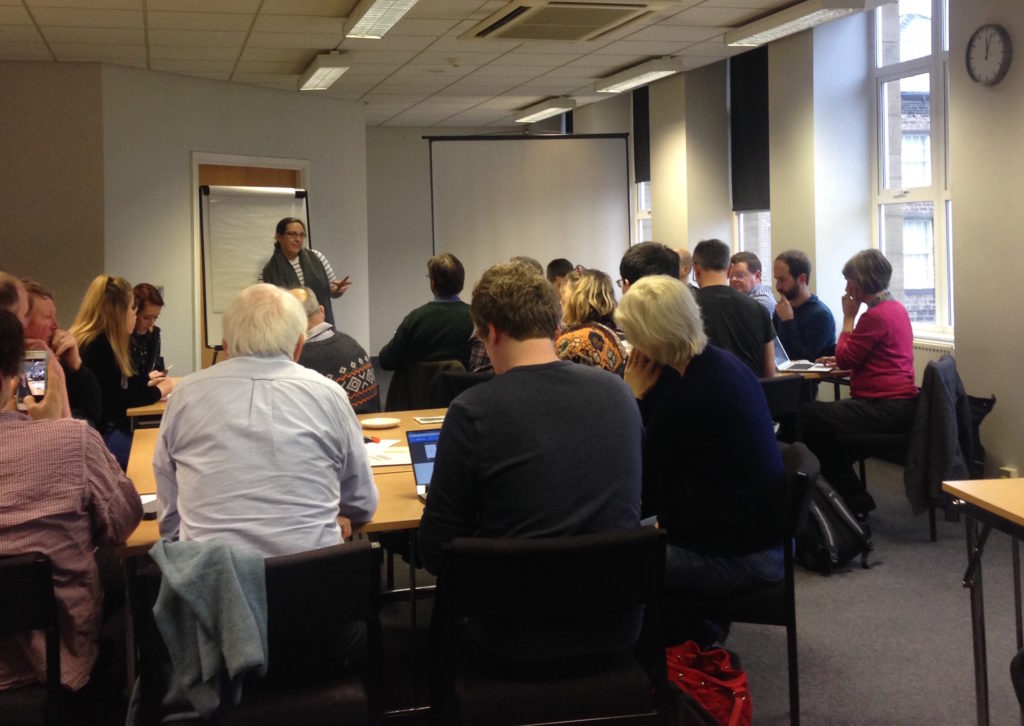This weekend, I was fortunate enough to attend the annual Notwestminster 2017 event which was held in the town of Huddersfield, West Yorkshire in the UK. Notwestminster focuses on local democracy and attracts a broad range of attendees from across government, academia and those with a general interest in all things democracy. The event involves a great combination of workshops, lightning talks as well as plenty of time for thought-provoking chats in-between.

We all popped a (slightly sleepy looking) owl on the map to mark where we had traveled from to get to Notwestminster
The day kicked off with a series of inspiring lightning talks (20 slides with 20 seconds per slide). Jacqui Gedman was first up, with her talk on ‘active citizens’. Jacqui advocated that government can get a much ‘better product’ by engaging with people locally on the ground. She also strongly believes that, often, it costs a lot less than councils think to engage locally and the results can bring much better outcome for citizens. Jacqui also advocated treating residents as citizens once again (as apposed to ‘customers’) – a theme which echoed throughout the morning workshop sessions.
“We need to consider residents as citizens again and not just as customers” (@GedmanJacqui)
Another stand-out lightning talk for me was Emily Warrillow’s moving account of how Jo Cox inspired her to get involved in youth politics. Emily recalled how Jo was not only an inspiration to her but also a good friend. Emily’s interest in local politics started when her mum encouraged her to attend a local planning meeting on how to use an abandoned building; an interest which developed into her becoming a youth Councillor and more recently being awarded the Diana award. Emily is a real inspiration for young leaders.

Next up were a series of workshops, which we could choose between depending on our interests. The first workshop I participated in was about argument mapping: a concept which focuses on mapping out discussions. This topic was of particular interest to me as I’m often encouraging or advocating the benefits of using our Dialogue tool to our customers. Argument maps help to display the flavour and essence of a debate and take aim to ‘de-personalise’ the argument. They have been traditionally used to map discussions in the houses of parliament, and we pondered over whether they could be used more readily in local government. Could argument maps be used to layout the decision making process for development control meetings for example?
Next up was a workshop on ‘how can local government encourage people to engage’? run by The Democratic Society team. On my table, we were tasked with discussing the role and identity of local government. We began by identifying what local government means to us; given that local government has a duty to deliver over 700 services on average, how can we improve the perception of local government to citizens that it exists for more than just service delivery? Esko Reinikainen, co-founder of The Satori Lab, had an idea at the end of our round-table of creating an augmented reality map to help educate stakeholders on where and how money from local government is used and distributed.
The afternoon wrapped up with a final series of lightning talks, one last workshop and a ‘lessons learnt’ presentation back. So what were the main recurring themes for the day? Here’s a handful I picked up from attendees:
- Vary and adapt chosen methods of engagement to suit the individuals being consulted with
- Create open spaces for debate (not just ‘we’ve decided x, what do you think?’) and be clear on the next steps
- The need to better understand how young people want to be engaged with – else there’s a growing risk of apathy towards politics
- Engagement and research need to be more closely connected.
- We need a much bigger effort to connect up innovators in local government (and avoid re-inventing the wheel).
Of course that’s not ‘it’ for Notwestinster 2017 – let’s keep these conversations flowing outside of these events (as we always advocate at the end of the day). Twitter’s normally pretty good for that…
And finally, special thanks to the Notwestminster organisers for bringing the event together and having us along. Roll on Notwestminster 2018!